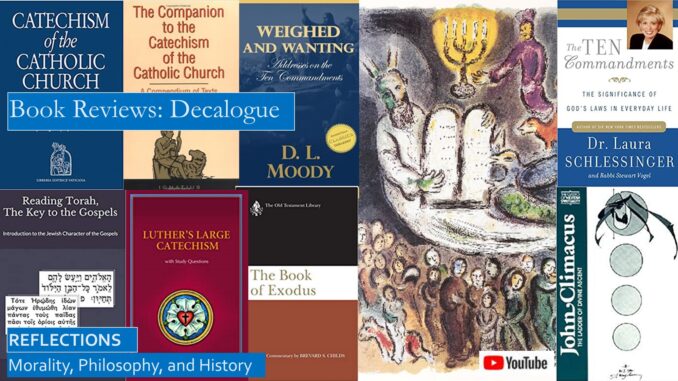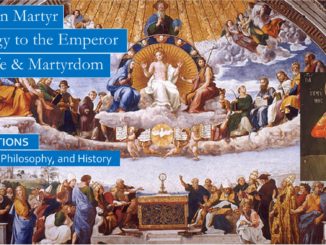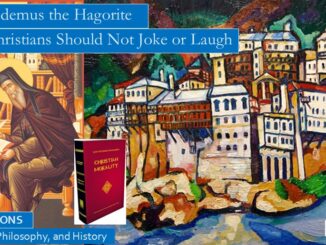
These are book reviews commenting on the Decalogue.
The YouTube version of this book review is at: https://youtu.be/KptDGFJG0TE
YouTube script with book links: https://www.slideshare.net/BruceStrom1/book-and-dvd-reviews-on-the-ten-commandments-or-decalogue
Our first sources are the Lutheran and Catholic Catechisms, they discuss each of the Ten Commandments. Pope Benedict, aka Cardinal Ratzinger when he was supervising the compilation of the catechism, balanced the footnotes for the sources used in the Catechism between the eastern and western church fathers, which means that this is an excellent study program for the writings of the Church Fathers for both the Catholic and Orthodox religious traditions.
The US Bishop’s version of the Catholic Catechism is available online, this is our preferred edition because of its extensive indices.
We have many videos/blogs on each of the Ten Commandments in the Decalogue, plus many more featuring writings from various Church Fathers, scholars, and preachers.
https://youtube.com/playlist?list=PLJVlY2bjK8li1ULMrgL23X-iA5aCENq6i
Writings by the Eastern Church Fathers in the Philokalia and the Ladder of Divine Ascent by St John Climacus include many discussions of various commandments. Most of these writings were written before the split between the Eastern and Western Churches, so they are as much Catholic as they are Orthodox.
One treasure is in Volume 4 of the Philokalia, is the outstanding essay by St Gregory Palamas on the New Testament Decalogue, which we will emphasize in each of our videos/blogs on the commandments.
https://youtu.be/rKVBhdHWHGI and https://youtu.be/Fco0W3bt5GA
We have essays on Martin Luther and his essays on the various of the Ten Commandments in both the Lutheran Small and Large Catechisms. The elephant in the room that needs to be confronted is his blatant anti-Semitism, and his tendency to call the pope some very nasty names, which we discuss in our video covering Luther and the commandment, DO NOT ENVY.
https://youtu.be/FQmBggJAhKg and https://youtu.be/jM2FrvyKsbk
We cut another video on book reviews of the commentaries on the Torah by the great medieval rabbis, Rambam, Ramban, and Rashi. Rambam is also known as Maimonides, and Ramban, Nachmanides. We also review other books covering the Torah, including the Book of Legends, a collection of moral teachings from the Talmud, and many other mostly Jewish sources, and they are all in English.
We have cut some videos on the Decalogue only using these Jewish sources, plus some surprisingly relevant and informative videos on chapters from Dr Laura and her rabbi’s book on the Decalogue.
https://youtu.be/KvKOCyREmQA and https://youtu.be/TOJr5J7N9Xc
Dr Laura: https://youtu.be/tlTymS2Bxxo and https://youtu.be/4G-k8NfvZJ8
The Intervarsity Press has published a series of selected commentaries by the ancient Eastern and Western Church Fathers, including many interesting obscure sources, and they are publishing some of these little-known sources in their own volumes. This is one of the first commentaries I consult when I study the Bible, because I prefer the Patristic commentary.
The IVP Reformation Commentary on Exodus had not been not published by mid-2022, later we will cut videos on the commandments using this as a source.
DL Moody’s commentary on the Ten Commandments, Weighed and Wanting, is also instructive, we will continue to include them in our general videos on the commandments.
Dr Laura and her rabbi have an excellent book on the Ten Commandments include practical observations from her show that are not found elsewhere. She also includes commentary from both Jewish and Christian sources.
Brevard Child’s commentary on Exodus is one of my favorite commentaries: he not only has valuable commentary on Exodus, but he also reviews the current scholarship, and comments on the commentaries by Luther and many other Protestant sources. This is one of the most readable and interesting Bible commentaries that I own.
St Thomas Aquinas wrote an easy-to-read Catechism that discusses each of the Ten Commandments. This translation is rendered in bullet-point, PowerPoint style, but it is the actual complete Aquinas.
The Catholic Catechism references his teachings in Summa Theologica on the commandment, Do Not Slander. You can pick up inexpensive used copies of his two volumes in the Great Books. Many thousands of sets were sold by Britannica salesman, many sitting in unread bookcases next to unplayed pianos in older homes all across America.
Don’t be intimidated by Aquinas’ reputation for writing works that are inscrutable. His moral teachings are as easy to read and understand as are the stoic teachings.
PROBLEM: Many eBooks on the Summa Theologica of St Thomas Aquinas leave out the part , question, and section numbers.
SOLUTION: Find the appropriate section in this or another table of contents, then do a text search in the eBook version for the title of what you wish to study, or a nearby selection with more unique words.
https://www.ewtn.com/catholicism/library/summa-theologica-table-of-contents-12541
We always like to consult the Baptist Broadman Bible Commentary, my edition was printed before the conservative takeover of their seminaries. We have not used them as a reference yet, but we will soon.
The Unseen Warfare contains teachings on the commandments. It is a third edition of a monastic spiritual manual written in the Middle Ages edited with additions by Orthodox monks from Mount Athos, the first edition was a Catholic classic, The Spiritual Combat and Peace of the Soul, penned by Scupoli in 1589. We plan a series of video on this classic in 2023+.
When I was studying the writings of the medieval rabbis on the Torah, and all the commandments of the Torah can be matched with one of the Ten Commandments, I realized that the style and cadence of the synoptic Gospels clearly were inspired by the Torah, the first five books of the Old Testament. This book seems to confirm this; although he is merely a talented layman, this book appears to have a wide reputation.
The Decalogue Through the Centuries reviews the commentaries on the Decalogue by Rambam, Aquinas, Luther, Calvin, John Wesley, Karl Barth, Popes John Paul II and Benedict XVI, and others. I plan to do a video on the book in the other column in late 2022.
The Decalogue in Jewish and Christian traditions contains interesting essays by many scholars, including essays on St Augustine, St Paul, Luther, natural law and the Decalogue, and other topics.
The Book on the Torah was hiding in my bookcase when I cut the video/blog on Book Reviews for the Torah, possibly because it was written by a Christian author.
The narrative cycles discussed include the Genesis Primeval Cycle, Abraham Cycle, Jacob Cycle, Joseph Cycle, and also essays on Exodus, Leviticus, Numbers, and Deuteronomy.
Roger Ebert did a review on the ten film series on the Decalogue by a Polish director soon after the fall of communism.
Excerpts from review:
Roger Ebert writes: “I taught a class on “The Decalogue” a few years ago,” “and found that we lost a lot of time trying to match up the films and the commandments. There isn’t a one-to-one correlation; some films touch on more than one commandment, and others involve the whole ethical system suggested by the commandments. These are not simplistic illustrations of the rules, but stories that involve real people in the complexities of real problems.”
“These ten films on the Decalogue are not philosophical abstractions but personal stories that involve us immediately; I hardly stirred during some of them. After seeing the series, Stanley Kubrick observed that Kieslowski and Piesiewicz “have the very rare ability to dramatize their ideas rather than just talking about them.” Quite so. There is not a moment when the characters talk about specific commandments or moral issues. Instead, they are absorbed in trying to deal with real-life ethical challenges.”
https://www.rogerebert.com/reviews/great-movie-the-decalogue-1988
We are sponsoring online viewings of the Decalogue films through 2022.
https://www.meetup.com/Reflections/
Many of the works written by the Apostolic Church Fathers discuss the various commandments, often referenced by the Catechism. We also discuss how to read the writings of the Apostolic and Early Church Fathers, and this video also discusses how to read the works of the ancient Church Fathers, particularly those included in the 38-volume set of the writings of the Ante-Nicene, Nicene, and Post-Nicene Church Fathers, east and west, which is now available in some excellent eBooks from Christian Book Distributors.
Why did we label our video/blog on Ordinary Life and Justice in Ancient Greece as part of our discussion of the commandment, DO NOT SLANDER?
In Scriptures, the exact wording is: Do not bear false witness against thy neighbor, which reflects the central role eyewitness testimony played in the ancient world, and, indeed, how sometimes eyewitness testimony was the only evidence admissible in ancient trials. Forensic science really did not exist before it was invented by Sherlock Holmes.
In late 2022 we will cut some videos/blogs on St Thomas Aquinas and the Ten Commandments, plus we will continue to cut videos by ancient Church Fathers on the Decalogue, including St Augustine, St Gregory of Nyssa, Shepherd of Hermas, and others. Many were referenced in footnotes in the Catholic Catechism.
https://youtu.be/PuY5KAyeDXc and https://youtu.be/NFQ3fGocis0 and https://youtu.be/xaqFTPgoDI0
Our video/blog on our Channel Philosophy also applies to our reflections on the Decalogue, since we discuss Biblical interpretation, and on how Christians can profitably read Greco-Roman, and modern, stoic and moral philosophy.




Be the first to comment